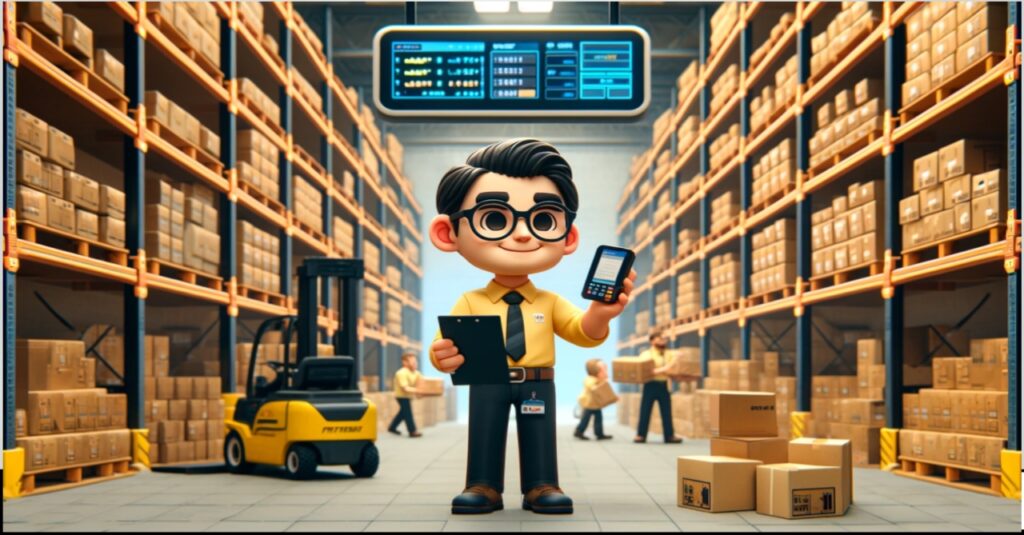Discover the essential educational requirements, duties, and responsibilities of a store keeper. Learn about the skills needed to manage inventory, maintain records, ensure safety, and excel in the role with this comprehensive guide.
Table of Contents
What Does It Take to Become a Store Keeper?
To become a storekeeper, candidates need a combination of education, relevant experience, and practical skills. While storekeeping may seem like a simple job on the surface, it is actually a multifaceted role requiring the ability to handle inventory, maintain accurate records, and manage logistics. Here’s what is typically required:
- Basic Education: Most storekeeper positions require at least a high school diploma or an equivalent qualification. This education provides essential literacy and numeracy skills, which are critical in managing inventory, handling stock counts, and understanding invoices and orders.
- Experience: Some organizations prefer candidates with prior experience in inventory management, warehouse operations, or logistics. Having experience in a similar role helps develop familiarity with stock control procedures, handling shipments, and managing the physical aspects of warehouse storage.
- Skills: Good organizational skills, attention to detail, and proficiency with inventory software are essential. Storekeepers need to handle large volumes of products while ensuring the proper documentation is maintained.
- Physical Stamina: Storekeepers often handle physically demanding tasks such as moving, lifting, or organizing inventory. A certain level of physical stamina is necessary to perform the job efficiently.

Educational Requirements for a Store Keeper: What You Need to Know
While the basic educational requirement for a storekeeper is a high school diploma, additional qualifications can enhance your prospects in the field, especially in industries with complex logistics needs like manufacturing, retail, or healthcare.
- High School Diploma: A minimum educational requirement that equips individuals with basic skills such as reading, writing, mathematics, and communication, which are essential for handling day-to-day store operations.
- Vocational or Technical Training: In industries such as manufacturing or engineering, having vocational training or technical courses related to supply chain management, logistics, or warehouse operations can make a candidate more competitive. Some organizations even offer their own internal training programs to develop storekeepers into specialized roles.
- Bachelor’s Degree: Although not mandatory, having a degree in business administration, logistics, supply chain management, or inventory control can help individuals access higher-paying and more specialized storekeeper roles, such as inventory manager or warehouse supervisor.
- Certifications: Certifications such as the Certified in Production and Inventory Management (CPIM) or Certified in Logistics, Transportation, and Distribution (CLTD) are valued by employers. These certifications provide additional expertise in managing stock, understanding supply chain processes, and using modern inventory management technologies.
- On-the-Job Training: Many storekeepers start with entry-level positions in warehouses or stores and receive on-the-job training to develop the required competencies, such as managing databases, using inventory software, and handling specific tools or equipment (like forklifts).
Duties of a Store Keeper: Managing Inventory and More
The storekeeper’s primary duty is the management and maintenance of inventory. This involves tracking the flow of products from the time they are received, stored, and issued to various departments or customers.

Key duties include:
- Receiving Goods: Storekeepers must receive shipments, inspect them for quality, and ensure the quantities match the purchase order. This may involve checking for damage, discrepancies, or missing items.
- Organizing and Storing Inventory: After receiving the goods, it is the storekeeper’s responsibility to organize them systematically in designated storage areas. This involves labeling items, categorizing them, and ensuring they are placed in the correct locations for easy retrieval.
- Stock Issuance: Storekeepers manage the issuance of materials or products to the appropriate department or person within an organization. They maintain careful records to ensure proper tracking of what’s been issued and what’s still in stock.
- Reordering Supplies: Monitoring stock levels is critical to avoid shortages. When the inventory reaches a certain threshold, storekeepers must reorder supplies or raise purchase requests.
- Managing Returns: Handling returns is another critical duty. Storekeepers are responsible for managing the return of defective, damaged, or excess products to suppliers.
Core Responsibilities Every Store Keeper Should Master
A successful storekeeper must master a set of core responsibilities that ensure the smooth functioning of the warehouse or storage facility:
- Inventory Control: This includes monitoring stock levels, organizing stock records, and ensuring accurate and timely data entry for every item that comes in or goes out. Regular stock audits or counts help maintain inventory accuracy and prevent discrepancies.
- Maintaining Documentation: Storekeepers are responsible for creating and maintaining accurate documentation for the items received and dispatched. This includes recording details of the goods, such as product descriptions, quantities, and invoice numbers.
- Stock Reconciliation: A critical aspect of storekeeping is the ability to reconcile physical stock with system records. This helps ensure there are no discrepancies between the actual stock and what’s recorded in the inventory management system.
- Handling Emergency Requests: Storekeepers must also be able to respond to urgent requests for inventory or supplies, ensuring that departments are never left without essential items.
Skills Store Keepers Need to Succeed in Their Role
The role of a storekeeper demands a variety of skills, including:Attention to Detail: Accuracy is essential in every aspect of storekeeping, whether it’s counting stock, recording inventory data, or inspecting shipments for quality. Even small mistakes can lead to costly inventory shortages or errors.
- Organizational Skills: Efficiently managing storage space and keeping the stock organized is crucial to ensure easy retrieval and smooth workflows. Storekeepers must also develop systems to optimize space utilization and prevent overstocking.
- Technical Skills: In modern warehouses, storekeepers use inventory management software to record stock levels, place orders, and track shipments. Proficiency in software like SAP, Oracle, or Microsoft Excel is highly advantageous.
- Problem-Solving: Storekeepers need to quickly resolve issues like stock shortages, misplaced items, or discrepancies in deliveries. Problem-solving skills help maintain workflow continuity in the face of such challenges.
- Physical Stamina: Given the physical nature of the job—lifting, moving, and organizing stock—physical endurance is necessary for handling these tasks effectively.
The Role of Technology in Store Keeping: A Modern Approach
Technology plays a critical role in the modern-day operations of storekeepers:
Inventory Management Systems (IMS): These digital systems allow storekeepers to track stock in real time, monitor stock levels, and generate reports. The use of software like QuickBooks, SAP, or Oracle ERP helps ensure data accuracy and automate repetitive tasks, such as reordering when stock levels hit a minimum threshold.
Barcoding and RFID: Many warehouses and stores now use barcoding systems or RFID (Radio Frequency Identification) tags to monitor and control inventory movements. These technologies help reduce errors in tracking items and streamline stock audits
.Automation: In some advanced settings, storekeepers may work alongside automated systems such as conveyor belts, automated storage and retrieval systems (AS/RS), or even robotic systems, which optimize the flow of goods in and out of storage.
Safety and Security: Key Store Keeper Responsibilities
Safety and security are crucial aspects of a storekeeper’s job, particularly in industries that handle hazardous materials or high-value goods.
Safety Procedures: Storekeepers must follow safety protocols, such as ensuring hazardous materials are stored correctly, using protective gear, and maintaining a clean, organized environment to avoid accidents. They are also responsible for ensuring that any dangerous goods are stored in compliance with government regulations and that all workers handling such goods are trained.
Security Protocols: Storekeepers are also tasked with implementing security measures to protect inventory from theft or damage. This includes controlling access to storage areas, installing security cameras, and using locking mechanisms where necessary. In high-security environments, storekeepers may also need to manage security clearances for those accessing certain stock.
Why Organization and Attention to Detail Are Vital for Store Keepers
Organization and attention to detail are two of the most critical attributes a storekeeper can have. A well-organized storage system ensures that goods can be located quickly and efficiently. Proper labeling, categorizing, and shelving can significantly reduce the time spent searching for items, improving overall productivity.
Preventing Errors: Attention to detail ensures that no stock discrepancies arise, reducing the chance of errors during audits or stock takes. This is especially important when it comes to issuing goods, as incorrect stock counts or errors can lead to production delays or customer dissatisfaction.
Time Management: Organized systems also help storekeepers manage their time more effectively, allowing them to focus on high-priority tasks like reordering stock or fulfilling urgent requests.
Conclusion
Storekeepers are vital in ensuring an organization’s operations run smoothly. By managing inventory, keeping accurate records, and maintaining safety and security, storekeepers contribute significantly to an organization’s success. With the right education, skills, and attention to detail, storekeepers can thrive in their roles and provide immense value to their employers.
FAQ: Store Keeper’s Guide
What qualifications do I need to become a store keeper?
Typically, a high school diploma is required. Additional training in supply chain management or inventory control, as well as certifications in related fields, can enhance your qualifications.
What are the main responsibilities of a store keeper?
The main responsibilities include managing inventory, receiving and organizing stock, issuing materials, maintaining accurate records, and ensuring safety and security in the storage area.
What skills are important for a successful store keeper?
Key skills include attention to detail, strong organizational abilities, proficiency in inventory management software, problem-solving skills, and physical stamina.
What safety measures should a store keeper follow?
Storekeepers should follow safety protocols, including proper storage of hazardous materials, maintaining a clean workspace, and implementing security measures to prevent theft.
Can a store keeper advance to higher positions?
Yes, with experience and additional training, storekeepers can advance to roles such as inventory manager, warehouse supervisor, or logistics coordinator.

1 thought on “Store Keeper’s Guide: Educational Requirements, Duties, and Responsibilities”